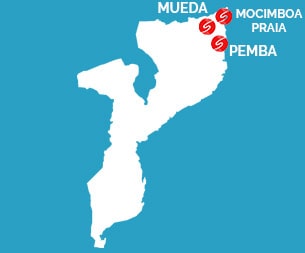
Context
The deployment of foreign troops has enabled the authorities to retake coastal territory. But as a result, non-state armed groups have spread out within the province. Guerilla operations have displaced over one million people (IOM, November 2022). This endemic violence is preventing many internally displaced people from returning to and cultivating their land. The ever-increasing number of people in temporary encampments is placing high pressure on available resources (food, drinking water, wood) in the province. Displaced people are facing desastrous living conditions; to survive, they have to rely on their families, host communities and humanitarian assistance.
- 33.55 million inhabitants
- 185th out of 191 countries on the Human Development Index
Our action

-
Mission
opened in 2019, 2021 -
Team
19 international staff
112 national staff - Budget 4.96M€
Our mission in Mozambique, which opened in June 2021, expanded in 2022 with the development of integrated, multi-sectoral programs covering “shelter, food security, WASH, management of camps for displaced persons and livelihoods”.
Our teams in Pemba, Mueda and Mocimbao are now able to support displaced people and returnees in all districts of Mozambique.
In 2022, our NGO worked with the public water supply body (FIPAG) to rehabilitate the water network in N’Tamba (Mueda district). This water network now serves over 100,000 people, including populations displaced by the conflict and host communities.
Institutional and private funding partners SDC, ECHO, IOM, UNICEF, WFP, UNHCR, CDCS, BHA
Operating partners NRC, ACF
Our impact

Rapid response to shocks during the emergency phase
- Rapid needs assessment
- Frontline response: Water, Sanitation and Hygiene (WASH) and Shelter

Restoring safe, decent living conditions for vulnerable populations
- Improving long-term access to water
- Support for community sanitation
- Provision of safe temporary shelters
- General food distribution

Maintaining access to public services
- Rehabilitation or construction of WASH infrastructure
- Water access management plan, capacity-building on water facilities
- Rehabilitation of key public infrastructure
- Support for agricultural production and fishing
Should you have any questions, please contact Justine Muzik Piquemal.

Vacancies
At head office
Worldwide
Internships
